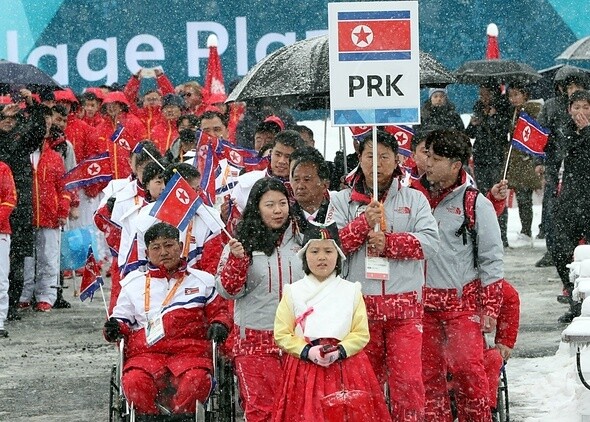hankyoreh
Links to other country sites 다른 나라 사이트 링크
Joint South-North entrance at Paralympics cancelled over Dokdo issue

A joint entrance by South and North Korean squad members at the 2018 Pyeongchang Winter Paralympics opening ceremony will not be happening due to a disagreement about the Dokdo issue. The announcement was made by the South Korean Paralympic Committee (KPC) under president Lee Myung-ho in an urgent press release issued on the evening of Mar. 8, one day ahead of the ceremony.
According to the KPC, the South and North Korean sides held a meeting at 10 am the same day on the issue of Dokdo’s inclusion on the Korean Peninsula flag for the two squads’ joint entrance. North Korea’s representatives insisted that their side “cannot accept failure to depict Dokdo for political reasons at an event staged in our homeland,” adding that their “pride does not allow us to fail to represent our national territory.”
The International Paralympic Committee (IPC) responded that in view of its strong partnership with the International Olympic Committee (IOC), it could not change the Korean Peninsula flag that had already been used in the Olympics. To avoid further debate, the IPC made the decision to respect both sides’ positions and have them enter separately – thus ending the plans for a joint entrance.
The Mar. 8 meeting was reportedly attended by KPC president Lee Myung-ho, secretary general Jeon Hye-ja, and general director and Icheon Training Center director Jeong Jin-wan from the South Korean side and North Korean Paralympic Committee delegation leader Kim Mun-chol from the North Korean side. Subsequent discussions were held at 5:20 pm after Lee proposed a second meeting with the North to work out a solution on the joint entrance issue, but the two sides failed to resolve their differences and the decision was made to have the two sides enter separately.
“While we would like an image of unity for the sake of national harmony and the ‘peace Paralympics,’ we hope that each side will respect and accept the other’s position and contribute to the event’s success going ahead,” the KPC said.
While the joint entrance will no longer be happening, the KPC proposed a joint torch relay, which the IPC and 2018 Pyeongchang Winter Paralympics Organizing Committee enthusiastically agreed to.
The ten-day-long Pyeongchang Paralympics are set to begin with an opening ceremony at Pyeongchang Olympics Stadium at 8 pm on Mar. 9. The opening comes 12 days after the end of the 2018 Pyeongchang Winter Olympics, which were widely seen as a success.
“I believe that the success of the Paralympics is the success of all Olympics,” said Pyeongchang Organizing Committee president Lee Hee-beom.
“Eighty-four percent of the South Korean public judged the Pyeongchang Winter Olympics to have been successful, and I want to make sure that 100 percent rate the Winter Paralympics as successful,” a confident Lee added.
Paralympic athletes will be contesting 80 gold medals in 15 events from six disciplines: Alpine skiing, snowboarding, biathlon, cross country skiing, ice hockey, and wheelchair curling. A record number of countries and athletes are participating, outnumbering the 45 countries and 547 athletes at the 2014 Sochi Winter Paralympics.
The number of gold medals was increased by eight from the Sochi event with snowboarding’s adoption as an official discipline. With Russia facing disciplinary action over a doping scandal, around 30 of its athletes will be competing as “neutral Paralympic athletes” (NPA).
By Kim Kyung-moo, senior staff writer
Please direct questions or comments to [english@hani.co.kr]

Editorial・opinion
![[Column] Park Geun-hye déjà vu in Yoon Suk-yeol [Column] Park Geun-hye déjà vu in Yoon Suk-yeol](https://flexible.img.hani.co.kr/flexible/normal/500/300/imgdb/original/2024/0424/651713945113788.jpg) [Column] Park Geun-hye déjà vu in Yoon Suk-yeol
[Column] Park Geun-hye déjà vu in Yoon Suk-yeol![[Editorial] New weight of N. Korea’s nuclear threats makes dialogue all the more urgent [Editorial] New weight of N. Korea’s nuclear threats makes dialogue all the more urgent](https://flexible.img.hani.co.kr/flexible/normal/500/300/imgdb/original/2024/0424/7317139454662664.jpg) [Editorial] New weight of N. Korea’s nuclear threats makes dialogue all the more urgent
[Editorial] New weight of N. Korea’s nuclear threats makes dialogue all the more urgent- [Guest essay] The real reason Korea’s new right wants to dub Rhee a founding father
- [Column] ‘Choson’: Is it time we start referring to N. Korea in its own terms?
- [Editorial] Japan’s rewriting of history with Korea has gone too far
- [Column] The president’s questionable capacity for dialogue
- [Column] Are chaebol firms just pizza pies for families to divvy up as they please?
- [Column] Has Korea, too, crossed the Rubicon on China?
- [Correspondent’s column] In Japan’s alliance with US, echoes of its past alliances with UK
- [Editorial] Does Yoon think the Korean public is wrong?
Most viewed articles
- 1‘We must say no’: Seoul defense chief on Korean, USFK involvement in hypothetical Taiwan crisis
- 2N. Korean delegation’s trip to Iran shows how Pyongyang is leveraging ties with Moscow
- 3‘Weddingflation’ breaks the bank for Korean couples-to-be
- 4Korea sees more deaths than births for 52nd consecutive month in February
- 546% of cases of violence against women in Korea perpetrated by intimate partner, study finds
- 6[Column] Park Geun-hye déjà vu in Yoon Suk-yeol
- 7Will NewJeans end up collateral damage in internal feud at K-pop juggernaut Hybe?
- 8Amnesty notes ‘erosion’ of freedom of expression in Korea in annual human rights report
- 9[Editorial] New weight of N. Korea’s nuclear threats makes dialogue all the more urgent
- 10[Column] Yoon’s first 100 days should open our eyes to pitfalls of presidential system